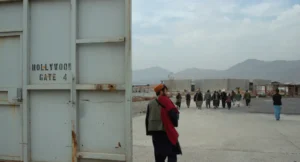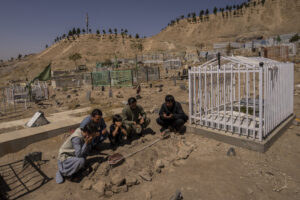Assad Baits Obama as the World Waits
It would seem a piece of wisdom picked up on the school playground not to start a fight that you don't know how to finish.
It would seem a piece of wisdom picked up on the school playground not to start a fight that you don’t know how to finish.
President Barack Obama may have missed this lesson during his primary school experience in Indonesia. But perhaps the U.S. Congress will spare him military folly with its vote next week on intervention in Syria.
France then might have to go to war alone against Syria or recruit a new coalition of its own. The last thing President Francois Hollande expected was for an American president to “go wobbly” about attacking another country (as Margaret Thatcher warned the first George Bush, when he seemed hesitant to intervene in Iraq’s invasion of Kuwait in 1990). It was shock enough for Mr. Hollande to discover last week that the majority of the British House of Commons are beer-drinking surrender monkeys. What if next week he should find the U.S. House of Representatives a passel of timid tea-sippers?
The confusion surrounding this current show of Western disunity and pacific intention has taken on a comic air (were the subject not tragedy and the butchery of war), not only in Paris and London but in Washington, in the White House and Pentagon, and in congressional circles. The Chairman of the Joint Chiefs of Staff, Army Gen. Martin Dempsey, has in the recent past made clear his own doubts about the merits and consequences of an attack on Syria, although his duty now is to follow orders.
There are other observers of the Pentagon and of the history of American foreign policy who point out that the U.S. military doesn’t really “do” limited and tailored military operations that deliver “a shot across the bow,” which is what President Obama said on public television last week he wants delivered to President Assad, to warn him off future uses of chemical weapons.
Others want much more. An editorialist at the Tel Aviv newspaper, Yedioth Ahronoth, considers that no warning shot but “two or three barrages [of Tomahawk missiles] would [make] it clear to all the Middle East’s madmen that the United States means what it says.”
Senators John McCain and Lindsay Graham, both hawkish on attack, talked with President Obama on Monday and emerged saying that the foreseen attack would “essentially be to degrade” the military capacity of Syria. Sen. Graham said he left the meeting “feeling better.” That assignment, however, is not a minor military operation, at least as the U.S. Air Force and Navy do it.
There is the problem as well that the victim may shoot back, as happens in wars. Should Syria’s ally Iran become involved in reaction to a Franco-American attack, it possesses a system of attack on warships, using anti-ship-missile-armed speedboat flotillas, taken by the U.S. Navy to be a serious threat. And everywhere generous supplies exist of long- and mid-range missiles.
President Assad, in an interview with Paris’s Le Figaro newspaper, said: “The Middle East is a powder keg and the fuse is getting shorter. We shouldn’t just talk about a Syrian response, but what will happen after the first strike. Everyone will lose control of the situation when the powder keg explodes. Chaos and extremism will spread. The risk of a regional war exists.”
The interviewer asks, “Would Syria attack Israel?” The president replies, “You surely don’t expect me to tell you what our riposte would be?”
The question remains what the U.S. should do. Vali Masr, head of the Johns Hopkins School of Advanced International Studies, says in a New York Times op-ed that America’s strategic interest is to “mortally wound” the Assad regime, and then immediately “take decisive action” to assure that Syria does not “become a haven for Al Qaeda.” Unless he knows forms of decisive action the rest of us do not, that means occupation with ground troops and those military measures that have in the past decade proven so successful in pacifying and eliminating terrorism in Iraq and Afghanistan.
He says, though: “That is what the world needs.” Another commentator at the Times, Ross Douthat, joins the multitude of American and foreign analysts who tell us that American military power must be used to create and sustain “a stable, rule-based, multilateral world order.” Thank you, Mr. Douthat.
Such recommendations all assume that international stability and order, which is the avowed goal of the U.S. and its allies, can be obtained and sustained by Western military intervention, war, occupation and “democratization” — meaning to effect a fundamental change of political and moral culture in societies remote from our own, who do not see the changes we wish to impose as necessarily desirable. They will undoubtedly change eventually at their own, and history’s, pace.
Let us all then pray that the Republican majority in the American House of Representatives, in conformity with their party’s long and honorable traditions of reaction and isolationism, will be joined by a handful of chastened Democrats in defeating next week the president’s proposal for creating another and enlarged Middle Eastern war. If such a vote accomplishes nothing else, it will at least spare the suffering people of Syria still more horror, inflicted by their American and French well-wishers.
Visit William Pfaff’s website for more on his latest book, “The Irony of Manifest Destiny: The Tragedy of America’s Foreign Policy” (Walker & Co., $25), at www.williampfaff.com.
© 2013 Tribune Media Services, Inc.
Your support matters…Independent journalism is under threat and overshadowed by heavily funded mainstream media.
You can help level the playing field. Become a member.
Your tax-deductible contribution keeps us digging beneath the headlines to give you thought-provoking, investigative reporting and analysis that unearths what's really happening- without compromise.
Give today to support our courageous, independent journalists.






You need to be a supporter to comment.
There are currently no responses to this article.
Be the first to respond.